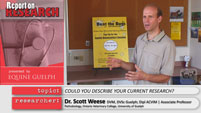ARCHIVE EQUINE NEWS STORIES
| Current news is available at TheHorsePortal.ca, Equine Guelph's online learning platform for practical, quick learning. Given the vast amount of information on horse health and welfare, Equine Guelph has archived its past news articles from 2002-2020. They are listed below, along with a search function available to find specific healthcare topics. | |
How Can Horse Farms Practice Biosecurity?April 2012
Click here for Report on Research Video Volume 4
-by Jackie Bellamy
Biosecurity in the horse industry can be a difficult concept to comprehend, and put into practice, especially when the average horse frequently travels off property or encounters horses that have been off the farm. However, lack of infection control procedures can leave a barn vulnerable to all kinds of diseases. Indeed it is an important topic to discuss with your veterinarian. This can include subjects such as: cleaning, disinfection, considerations to make when moving horses around and testing of horses when they become sick.
According to University of Guelph Researcher and author of the “Worms and Germs” blog, Dr. Scott Weese, “Having a basic infection control plan in place is probably the biggest thing someone can do to reduce the risk of disease.” Weese goes on to stress, “It does not matter what you do with your horse(s), or whether you have only one horse, or a herd of 100, as an owner you should have a general idea of the measures you are going to take in order to reduce the risk of infection.” Weese has been working in the area of biosecurity and infection control for over 15 years trying to find better ways to prevent and treat infectious diseases with a strong emphasis on prevention including giving talks at Equine Guelph’s new biosecurity workshops and two week e-Session.
Weese studies a wide range of diseases, one of which includes current diseases where the virus may change, like the Equine Herpies virus. He also mentions diseases that spring up out of nowhere, like West Nile virus, and cautions even though the disease may first appear on another continent we are always at risk for new and emerging diseases.
Weese and Dr. Maureen Anderson of the Ontario Veterinary College's Centre for Public Health and Zoonoses have been tracking diseases and infections all over the world. For the last three years they have been posting helpful information for horse and pet owners, first with “equIDblog” and now via the “Worms and Germs blog.” Keeping tabs on emerging diseases in the area is valuable information when discussing the importance and timing of a vaccination program with your veterinarian. This will help ensure the program is a good fit for the needs of your horse. Weese cautions that vaccination should not be the only biosecurity practice horse owners engage in.
Any time a horse goes off the farm and encounters other horses it has a chance of contracting an infectious disease. A few ways to lower those risks include: avoiding nose to nose contact, not sharing water buckets and grooming equipment and avoid having people that are handling other horses handle your own horses.
This brings us to the topic of what to do when returning from a trip off the farm. Ideally a horse that leaves the farm and is exposed to other horses should come home to a quarantine protocol to reduce the chances of spreading infections to the entire herd. Although this is not always possible, due consideration should be given to keeping the housing separate for horses that travel frequently especially if you also keep horses at greater risk of infection such as broodmares or foals.
Weese was the first speaker at the launch of Equine Guelph’s “Beat the Bugs” biosecurity workshops and says, “These workshops are great for getting people thinking in a broader context when it comes to infection control and putting into practice the easy day to day steps which can reduce outbreaks of disease.”
Read - Scott Weese biography
Funding for the Report on Research and Help for Horseowners videos has been provided by the Knowledge Translation and Transfer Program under the OMAFRA-U of G Partnership.
To learn more about protecting your horse from infectious disease- sign up for Equine Guelph’s upcoming Biosecurity e-Session April 16 -19

